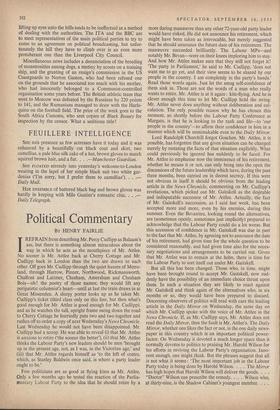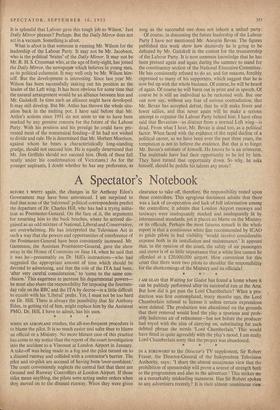Political Commentary
BY HENRY FAIRLIE IREFRAIN from describing Mr. Percy Cudlipp as Balaam's ass, but there is something almost miraculous about the way in which he acts as the mouthpiece of Mr. Attlee. No sooner is Mr. Attlee back at Cherry Cottage and Mr. Cudlipp back in London than the two are drawn to each other. Off goes Mr. Cudlipp through the quiet haunts of Metro- land, through Harrow, Pinner, Northwood, Rickmansworth, Chalfont and Latimer, Chesham, Amersham and Chesham Bois—oh ! the poetry of those names; they would lift any peripatetic columnist's heart—until at last the train draws in at Great Missenden. A sleepy porter looks up as he takes Mr. Cudlipp's ticket (third class only on this line, but then what's good enough for Mr. Attlee is good enough for Mr. Cudlipp). and as he watches the tall, upright frame swing down the road to Cherry Cottage he hurriedly puts two and two together and rushes off to order a copy of next Wednesday's News Chronicle. Last Wednesday he would not have been disappointed: Mr. Cudlipp had a scoop. He was able to reveal (i) that Mr. Attlee is anxious to retire (`the sooner the better'), (ii) that Mr. Attlee thinks the Labour Party's new leaders should be men 'brought up in the present age, not, as I was, in the Victorian age,' and (iii) that Mr. Attlee regards himself as 'to the left of centre, which, as Stanley Baldwin once said, is where a party leader ought to be.'
Few politicians are as good at flying kites as Mr. Attlee. Only a few months ago he tested the reaction of the Parlia- mentary Labour Party to the idea that he should retire by a more daring manoeuvre than any other 72-year-old party leader would have risked. He did not announce his retirement, which might have been taken as irrevocable, but merely suggested that he should announce the future date of his retirement. The manoeuvre succeeded brilliantly. The Labour MPs—and notably Mr. Bevan—were on their knees imploring him to stay. And how Mr. Attlee makes sure that they will not forget it! `The party in Parliament,' he said to Mr. Cudlipp, 'does not want me to go yet, and their view seems to be shared by our people in the country. I am completely in the party's hands.' Read those words again. Just let the smug self-confidence of them sink in. Those are not the words of a man who really wants to retire. Mr. Attlee is at it again : kite-flying. And he is clever enough this time to let Mr. Cudlipp hold the string. Mr. Attlee never does anything without deliberation and cal- culation. The only possible reason why he has chosen this moment, so shortly before the Labour Party Conference at Margate, is that he is looking to the rank and file—to 'our people in the country'—to affirm their confidence in him in a manner which will be unmistakable even to the Daily Mirror.
Lord Randolph Churchill forgot Goschen. Mr. Attlee, it is possible, has forgotten that any given situation can be changed merely by restating the facts of that situation explicitly. What could previously be ignored has suddenly to be faced. For Mr. Attlee to emphasise now the imminence of his retirement, whether he means it or not, can only bring into the open the discussions of the future leadership which have, during the past three months, been carried on in decent secrecy. If this were not obvious in itself it should be obvious from the leading article in the News Chronicle, commenting on Mr. Cudlipp's revelations, which picked out Mr. Gaitskell as the desirable and indisputable successor of Mr. Attlee. Actually, the fact of Mr. Gaitskell's succession, as I said last week, has been accepted more and more, even by his enemies, during this summer. Even the Bevanites, looking round the alternatives, are (sometimes openly, sometimes just implicitly) prepared to acknowledge that the Labour Party could do a lot worse. But this accession of confidence in Mr. Gaitskell was due in part to the fact that Mr. Attlee, by agreeing not to announce the date of his retirement, had given time for the whole question to be considered reasonably, and had given time also for the neces- sary negotiations and arrangements to be carried out. Given that Mr. Attlee was to remain at the helm, there is time for the Labour Party to sort itself out under Mr. Gaitskell.
But all this has been changed. Those who, in time, might have been brought round to accept Mr. Gaitskell, now sud- denly have the possibility of an immediate choice thrust upon them. In such a situation they are likely to react against Mr. Gaitskell and think again of the alternatives who, in six months or so, they would have been prepared to discard. Discerning observers of politics will read with care the leading article in the Daily Mirror on Wednesday, the same day on which Mr. Cudlipp spoke with the voice of Mr. Attlee in the News Chronicle. If, as Mr. Cudlipp says, Mr. Attlee does not read the Daily Mirror, then the fault is Mr. Attlee's. The Daily Mirror, whether one likes the fact or not, is the one daily news- paper in this country which is an important political power- factor. On Wednesday it devoted a much longer space than it normally devotes to politics to praising Mr. Harold Wilson for his efforts in reviving the Labour Party's organisation. Inno- cent enough, one might think. But the phrases suggest that all is not what it seems : 'The most important job in the Labour Party today is being done by Harold Wilson. . . . The Mirror has high hopes that Harold Wilson will deliver the goods. . . • "Doctor" Wilson can prescribe the remedy. . . . Wilson who, at thirty-nine, is the Shadow Cabinet's youngest member. . . . It is splendid that Labour gave this tough job to Wilson.' Just Daily Mirror phrases? Perhaps. But the Daily Mirror does not act in a vacuum. Something is afoot.
What is afoot is that someone is running Mr. Wilson for the leadership of the Labour Party. It may not be Mr. Jacobson, who is the political 'brains' of the Daily Mirror. It may not be Mr. R. H. S. Crossman who, at the age of forty-eight, has joined the Daily Mirror, the newspapdr which believes in young men, as its political columnist. It may well only be Mr. Wilson him- self. But the development is interesting. Since last year Mr. Wilson has been successfully staking out his position as the leader of the Left wing. It has been obvious for some time that the natural arrangement would be an alliance between him and Mr. Gaitskell. In time such an alliance might have developed. It may still develop. But Mr. Attlee has thrown the whole situ- ation back in the melting pot. I have said before that Mr. Attlee's actions since 1951 do not seem to me to have been marked by any genuine concern for the future of the Labour Party. With his position and his prestige he could have pre- vented most of the nonsensical feuding—if he had not wished to divide and rule. He is determined that Mr. Herbert Morrison, against whom he bears a characteristically long-standing grudge, should not succeed him. He is equally determined that Mr. Jim Griffiths should not succeed him. (Both of these fall neatly under his condemnation of Victorians.) As for the younger aspirants, I doubt whether he has any preference, as long as the successful one does not inherit a united party.
Of course, in discussing the future leadership of the Labour Party I have not mentioned Mr. Aneurin Bevan. The figures published this week show how decisively he is going to be defeated by Mr. Gaitskell in the contest for the treasurership of the Labour Party. It is now common knowledge that he has been pressed again and again during the summer to stand for the constituency section of the National Executive Committee. He has consistently refused to do so, and for reasons, forcibly expressed to many of his supporters, which suggest that he is now fed up with the whole business. Of course, he will be heard of again. Of course he will burst out in print and in speech. Of course he is still an individual to be reckoned with. But one can now say, without any fear of serious contradiction, that Mr. Bevan has accepted defeat, that he will make fewer and fewer sallies, and that never again will he make a serious attempt to organise the Labour Party behind him. I have often said that Bevanism—as distinct from a normal Left wing—is dead. From what I hear, Mr. Bevan is dead too, as a political factor. When faced with the evidence of the rapid decline of a political career, as we have been over the past three years, the temptation is not to believe the evidence. But that is to forget Mr. Bevan's estimate of himself. He knows he is an aristocrat. The multitude have had their opportunity to be led by him. They have turned that opportunity down. So why, he asks himself, should he peddle his talents any more?



































 Previous page
Previous page